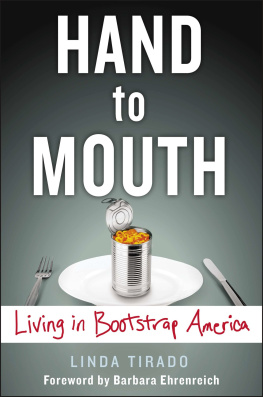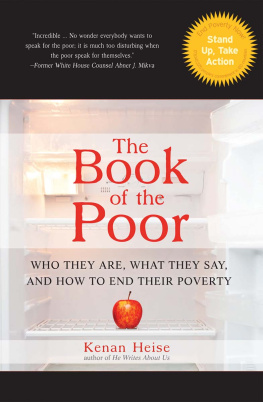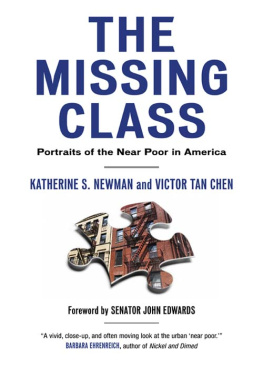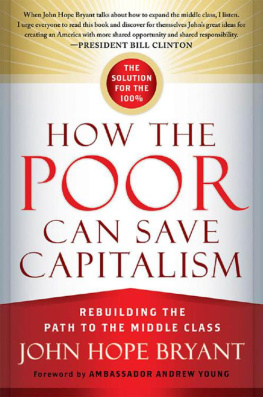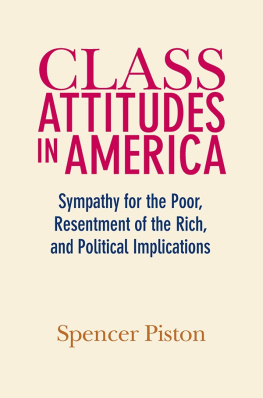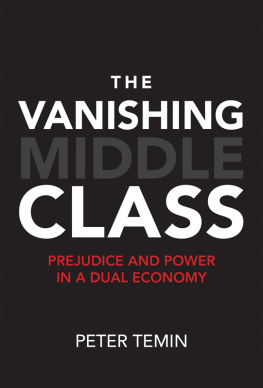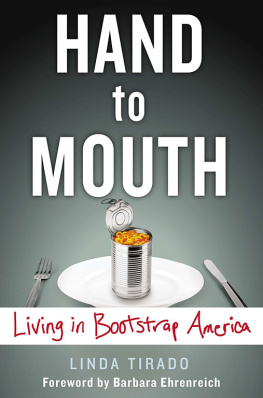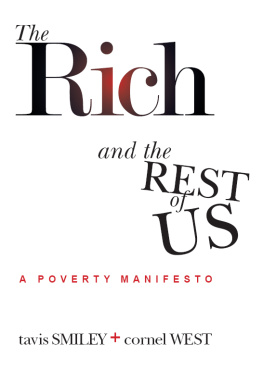G. P. PUTNAMS SONS
Penguin supports copyright. Copyright fuels creativity, encourages diverse voices, promotes free speech, and creates a vibrant culture. Thank you for buying an authorized edition of this book and for complying with copyright laws by not reproducing, scanning, or distributing any part of it in any form without permission. You are supporting writers and allowing Penguin to continue to publish books for every reader.
Penguin is committed to publishing works of quality and integrity. In that spirit, we are proud to offer this book to our readers; however, the story, the experiences, and the words are the authors alone.
Foreword
By Barbara Ehrenreich
I ve been waiting for this book for a long time. Well, not this book, because I never imagined that the book I was waiting for would be so devastatingly smart and funny, so consistently entertaining and unflinchingly on target. In fact, I would like to have written it myselfif, that is, I had lived Linda Tirados life and extracted all the hard lessons she has learned. I am the author of Nickel and Dimed, which tells the story of my own brief attempt, as a semi-undercover journalist, to survive on low-wage retail and service jobs. Tirado is the real thing.
After my book came out in 2001, I spent over ten years on the road talking about it at union conferences, church gatherings, and mostly on college campuses. I did this partly for the money because I had lost my best-paying journalistic job in 1997, and then a few years later the media decided that writers no longer needed to be paid at all, as if writing involves no caloric expenditure whatsoever.
But I also did it because I was on a mission. People often asked how my work for Nickeland Dimed changed me, and I think they meant how did it make me, as a middle-class person, more aware of the poor. Well, I didnt need that much more awareness since I was born into the lower rung of the working class and managed to re-land in it by becoming a single mother and then marrying a warehouse worker when I was in my thirties. So my stint as a low-wage worker/journalist had only one major effect on me: It moved me from concern about the exploitation of low-wage workersto something more like rage.
I had expected to experience material deprivation in my life at $7 an hour (the equivalent of about $9 today), and I certainly did. The fact that I had some built-in privileges like a working car (I got a Rent-A-Wreck in each of the cities where I worked so I wouldnt end up writing a book about waiting for buses) only made the deprivation part more shocking. Here I wasin good health, with no small children in my careworking full-time, sometimes more than one job at time, sometimes to the point where my legs felt like rubber, and I was living in a dump and dining at convenience stores or Wendys.
What I had not expected was the daily humiliation, the insults and what seemed like mean-spirited tricks. To be poor is to be treated like a criminal, under constant suspicion of drug use and theft. It means having no privacy, since the boss has the legal right to search your belongings for stolen items. It involves being jerked around unaccountably, like the time Wal-Mart suddenly changed my schedule, obliterating the second job I had lined up. It means being ordered to work through injuries and illness, like the debilitating rash I once acquired from industrial-strength cleaning fluids.
And what was most amazing to me: Being a low-wage worker means being robbed by the very employer who is monitoring you so insistently for theft. You can be forced to work overtime without pay or made to start working forty-five minutes before the time clock starts ticking. If you do the math, you may find that a few more hours have been shaved off your paycheck each week by the corporations computers.
But when I made my way from campus to campus, telling my stories about work and urging students to take an interest in all the low-wage workers who were making their education possible every daythe food service workers, janitors, clerical workers, and adjunct facultyI was invariably asked the question that boils down to: Whats wrong with these people? Meaning the workers, not their bosses.
Typically, the questioner would be a frat boy who had taken Econ 101, a course which exists, as far as I can see, for the sole purpose of convincing young people that the existing class structure is just, fair, and unchangeable anyway. If theres nothing wrong with our economic arrangements, then the only remaining question is: Why do these people have children, lack savings, fail to go to college, eat junk food, smoke cigarettes, or whatever else is imagined to be holding them back?
So when I came across Linda Tirados blog about six months ago, I felt an enormous wave of vindication. Evenor, perhaps, especiallyher admission that she smokes cigarettes hit me like a gust of fresh air. She tells what its like to be a low-wage worker for the long term, with an erratically employed husband and two small children to raise and support. She makes all the points I have been trying to make in my years of campaigning for higher wages and workers rights: That poverty is not a culture or a character defect; it is a shortage of money. And that that shortage arises from grievously inadequate pay, aggravated by constant humiliation and stress, as well as outright predation by employers, credit companies, and even law enforcement agencies.
But let me get out of the way now. She can tell this so much better than I can.
Introduction
I n the fall of 2013, I was in my first semester of school in a decade. I had two jobs; my husband, Tom, was working full-time; and we were raising our two small girls. It was the first time in years that we felt like maybe things were looking like theyd be okay for a while.
After a particularly grueling shift at work, I was unwinding online when I saw a question from someone on a forum I frequented: Why do poor people do things that seem so self-destructive? I thought I could at least explain what Id seen and how Id reacted to the pressures of being poor. I wrote my answer to the question, hit post, and didnt think more about it for at least a few days. This is what it said:
WHY I MAKE TERRIBLE DECISIONS, OR, POVERTY THOUGHTS
Theres no way to structure this coherently. They are random observations that might help explain the mental processes. But often, I think that we look at the academic problems of poverty and have no idea of the why. We know the what and the how, and we can see systemic problems, but its rare to have a poor person actually explain it on their own behalf. So this is me doing that, sort of.
Rest is a luxury for the rich. I get up at 6 a.m., go to school (I have a full course load, but I only have to go to two in-person classes), then work, then I get the kids, then I pick up my husband, then I have half an hour to change and go to Job 2. I get home from that at around 12:30 a.m., then I have the rest of my classes and work to tend to. Im in bed by 3. This isnt every day, I have two days off a week from each of my obligations. I use that time to clean the house and soothe Mr. Martini and see the kids for longer than an hour and catch up on schoolwork. Those nights Im in bed by midnight, but if I go to bed too early I wont be able to stay up the other nights because Ill fuck my pattern up, and I drive an hour home from Job 2 so I cant afford to be sleepy. I never get a day off from work unless I am fairly sick. It doesnt leave you much room to think about what you are doing, only to attend to the next thing and the next. Planning isnt in the mix.

